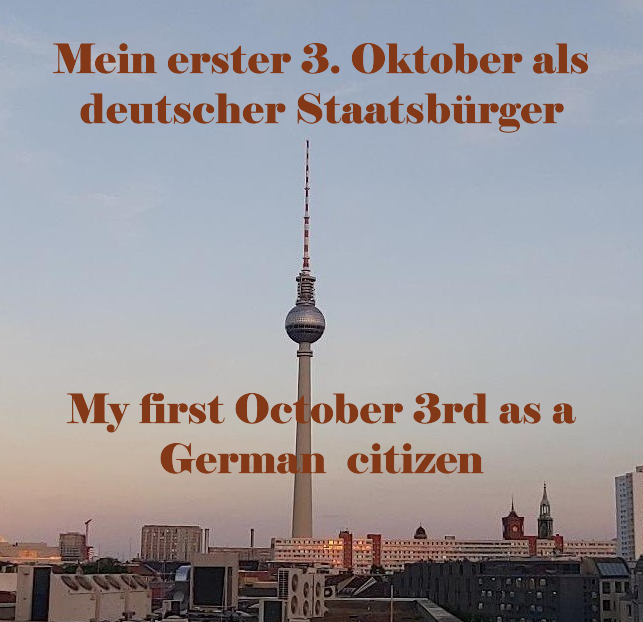Today marks my first October 3rd — the Day of German Unity — as a German citizen. This day commemorates the reunification of East and West Germany in 1990, a moment of profound historical significance. For me, becoming a German citizen is not just a legal milestone; it is a moment to reflect on the values, responsibilities, and challenges that define this nation.
Looking at Germany today, I see a country at a historical inflection point, one reminiscent of the fall of the Berlin Wall. That event symbolized freedom, opportunity, and the courage to build a new future. Today, Germany faces a different but equally profound test: its character, unity, and commitment to democracy are being challenged by global crises, technological upheavals, and societal pressures.
In this context, two themes emerge as critical: resilience and sovereignty. They are no longer optional ideals — they are imperatives for Germany’s future.
Resilience: A Strategic Necessity
Resilience is no longer a “nice-to-have.” It is the ability to withstand crises, adapt quickly, and recover stronger than before. In today’s world, resilience must be embedded across multiple layers:
- Human resilience – Leaders and citizens must navigate complexity and uncertainty with clarity and courage.
- Organizational resilience – Businesses and institutions must maintain operations during crises, from cyberattacks to supply chain disruptions.
- Societal resilience – Governments and communities must build public trust, safeguard infrastructure, and respond effectively to systemic shocks.
Consider the digital landscape: the rise of ransomware attacks, critical infrastructure vulnerabilities, and geopolitical cyber tensions demonstrate that failure to invest in resilience has high costs. Germany’s ongoing efforts in cybersecurity, digital infrastructure, and public-private collaboration are critical, but resilience cannot be reduced to technical fixes alone — it requires processes, culture, and leadership aligned with strategy.
Resilience is also economic. Germany’s industrial base, from automotive to manufacturing, depends on supply chains that cross multiple countries and regions. Disruptions in materials, energy, or technology inputs can have cascading effects. Building resilience means anticipating risks, diversifying suppliers, and designing systems that can continue functioning under pressure.
Sovereignty: Strength Through Independence
Closely linked to resilience is sovereignty. True sovereignty is not isolation; it is the freedom to make decisions and control critical capabilities. For Germany, this includes:
- Technological sovereignty – Developing domestic capabilities in AI, semiconductors, cloud infrastructure, and cybersecurity.
- Economic sovereignty – Reducing dependence on single suppliers for critical goods, energy, and raw materials.
- Political sovereignty – Maintaining the ability to make strategic decisions independently and together with fellow EU nations while engaging responsibly with international partners.
A Strong Germany Can Lead the Free World
Leadership is not just about military or economic power — it is about credibility, vision, and the ability to act consistently with your values. Germany has the potential to be a leading actor among free nations, advocating for democracy, stability, and cooperation.
But to lead effectively, Germany must first be strong and sovereign internally. Strength without resilience is brittle; independence without capability is hollow. The ability to protect democracy, secure critical infrastructure, and foster innovation ensures that Germany can act decisively in crises and uphold its values on the world stage.
A strong, sovereign Germany also sets an example for Europe. By combining resilience with strategic independence, Germany can help shape a Europe that is secure, innovative, and united, capable of navigating global uncertainty while protecting its citizens and democratic institutions.
Lessons for Businesses and Society
The principles of resilience and sovereignty are not limited to national strategy. They apply equally to businesses, institutions, and civil society:
- Invest in redundancy and diversification – Supply chains, IT systems, and critical operations must have alternatives in case of disruption.
- Embed resilience in culture and leadership – Teams must be trained to respond to crises with speed, clarity, and accountability.
- Prioritize sovereignty in strategic decisions – This includes choosing trusted technologies, controlling critical data, and reducing overdependence on external actors.
- Balance collaboration and independence – Partnerships are essential, but so is the ability to act autonomously when necessary.
Germany’s path demonstrates that sovereignty and resilience are mutually reinforcing. A society that can absorb shocks, adapt, and make independent decisions is stronger economically, politically, and culturally.
Reflections on October 3rd
On this October 3rd, I do not celebrate unity as a static achievement. I celebrate a continuing responsibility: to uphold democracy, to strengthen systems and institutions, and to ensure that freedom and stability endure.
Germany’s history teaches us that freedom is precious but fragile. Its future depends on embedding resilience and sovereignty at every level: human, organizational, and societal. By doing so, Germany can not only protect itself but also lead others, embodying the principles of freedom, responsibility, and democratic governance in a complex, interconnected world.
As a new citizen, I am inspired by the commitment, character, and vision I see in Germany today. Resilience and sovereignty are not abstract ideals — they are the foundation of a nation capable of leading the free world while remaining free itself.

